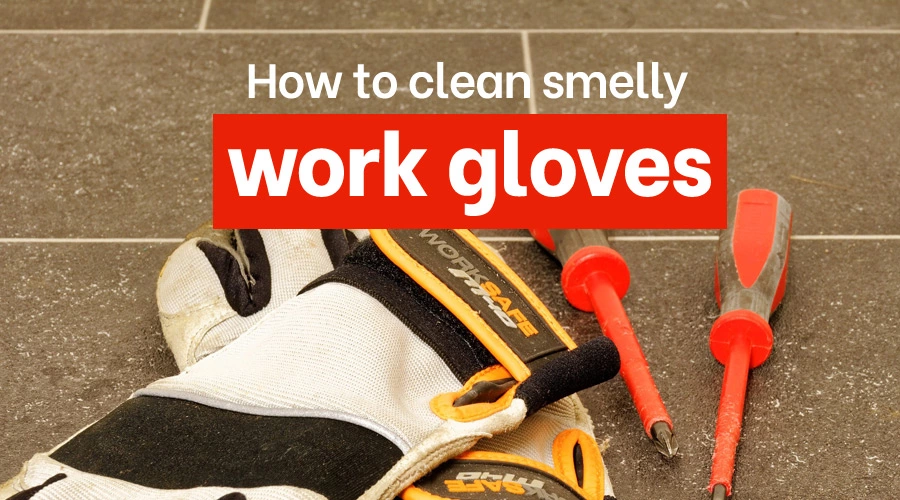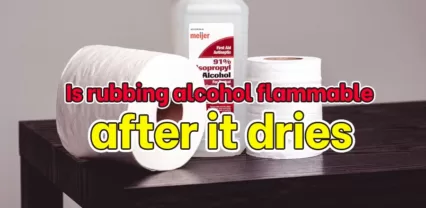While performing some tasks both at home and at work, we are exposed to specific injury-causing hazards that could put our safety at risk. Injuries that may occur could be blisters, broken bones, chemical burns, or just a cut. Therefore homes and companies take different measures to protect themselves against these possible hazards. Among them is the use of protective work gloves.
Protective gloves may leave our hands sweaty, making our hands produce a foul smell after use. As a result, people are often bothered with how to clean smelly work gloves, which has prompted my decision to write this article to provide a solution to that and some other rising issues related to protective work gloves.

Ever imagine workers’ lives in a society where there is no law mandating employers to provide their employees with protective kits while carrying out their daily duties? Or a home where most daily tasks are done with bare hands with no protective materials?
Although there’s no law mandating each home to provide gloves for washing dishes or wearing helmets because you decide to fix the liking roof by yourself so there might not be a punitive measure, but for companies, there are established laws with daring consequences for lawbreakers.
In the united states, 3 U.S departments of labor are vested with the responsibility of monitoring the compliance level of the law enacted to ensure that the safety and health of workers are guaranteed while performing their duties. These departments are;
- Occupational safety and health administration
- Mine safety and health administration
- Fair labor standard act
So after those necessary preambles, how about we delve into providing solutions to these problems arising from solving other problems?
How to clean a smelly work glove?
Work gloves are protective gears worn to protect the hand from possible hazards that one might encounter at work or during daily house chores. Protective work gloves usually cover the wrist and the fingers and protect against hazards like skin infection due to chemical reactions, cuts, blisters, punctures, infectious diseases, e.t.c.
The type of work glove to use depends mainly on the profession of the user. Every profession has a type of work gloves that suits the nature of their profession. Some of these professions include; Doctors, fire-service men, forensic scientists, butchers, divers, cleaners, welders, food nutritionists, culinary, Gardeners, woodcutters, security personnel, etc. Types of work gloves used in different professions in all works of life are classified into two categories.
- Classification based on material
- Classification based on nature of work.
Classification based on material: These work gloves are based on the materials used by the manufacturers during production. Types of work gloves based on the material used include; Leather gloves, Latex rubber or plastic gloves, Kelvar gloves, Butyls rubber gloves, cotton/fabric gloves, coated fabric gloves, etc.
Each of these work gloves has peculiar features that make it uniquely different from the others. You can search more about each of them as such information is beyond the scope of this article.
Classification based on work: This classification is based on the work or project the user intends to execute. Types of work gloves based on nature of work include; Vibration or impact resistance gloves, punctured resistance gloves, aluminized gloves, waterproof gloves, heavy-duty gloves, etc.
After much elementary information about work gloves, it has become apparent that providing information on how to clean a smelly work glove is laborious and beyond the scope of this article as there are suitable unique methods of cleaning for each type of work glove. Therefore, the information that will be provided in this section shall be based on generally accepted methods that can work for almost all the different types.
After some research, I have been able to make two exciting discoveries that could serve as a valuable tip to ensure you have a smell-free work glove. Note: Each tip comes from different sources. So each shall be explained separately.
Tip 1
- Put in a freezer after use: I definitely can tell what your facial expression looks like right now ( kinda like that of a girl who just got proposed to?) I’m sure it is. But don’t be, I actually had the same expression on when I saw it the first time. It worked for me anyway, so you might also wanna try it too.
Tip 2
- No stink deodorizer: No stink deodorizer is the best for gloves that be very difficult to wash and can be reused over and over again. Doesn’t that sound amazing? No stink deodorizer is an anti-bacteria deodorant that helps to can help neutralize all bacteria formed as a result of a long sweaty day at the gym or work. It’s pretty easy to use, all you gotta do is place the deodorant in your gloves and you wait for your result.
Why do gloves smell bad?
Ever wonder why your hand or glove smells when you take them off after completing a task? Well, it’s majorly because we end up with sweaty palms after a job, or complete our daily house chores.
When our gloves are covered in sweats, it becomes a breeding space for stinky bacteria, giving your gloves the unpleasant odor you perceive anytime you take them off.
Sweat is natural, but I bet you can’t control that. But there are certain things you do that encourage the growth of these bacteria, and if necessary steps are not taken, you might lose some gym buddies or colleagues because they might keep some distance from you.
So here are some tips as to the likely causes.
1. Lack of proper hygiene
After finishing a prolonged workout session at the gym, most people dump their gloves into their gym bags and leave them there to be picked up the second day when they need them at the gym or work. Some people do this because they have a particular day fixed for general cleanup (every 2 or 3 days after use). This is a wrong idea as our gloves need our attention every day.
2. Storage problem
You don’t leave your gloves lying on the floor in your room or on the shelf after use. After using your gloves, make sure you open them up for proper ventilation because most gloves are not designed to accommodate air.
3. A pair of hand-wrap
Most people use just a pair of hand wraps with their gloves, making it difficult for them to clean up after use. Handwraps can protect the hand from actual contact with the glove, and they can go above most of these sweats without getting to the glove.
This is applicable to people who use gloves that are difficult to wash. Having more than one hand-wrap could help you prevent a smelly glove as you can easily pick up another one while you sundry the previously used one after wash.
How to get smell out of work gloves
What usually comes to your mind when you see a baking soda? Oh well, it’s just a leavening agent, so I better think of making cakes, muffins, or cookies. If that’s all you know about baking soda, here’s one more thing they can be used for. They are odor absorbers! They just might save you from public embarrassment as much as they help keep your belly filled up. Plus, you can also use anti-spray if you are too lazy to wash the wet glove that day.
How to clean leather work gloves
The leather glove is one of the most used out there, but they can be so difficult to wash because of their toughness (I guess that’s what made them famous in the first place). Keeping your leather-gloved clean always will make it more durable and last longer. So here are some tips to ensure your leather glove stays clean.
- Ensure to wash them in cold water with saddle soaps and lay them flat out and avoid wringing because it could deform the glove. And also, keep them away from direct sunlight after use.
- Get rid of dirt on the glove with a brush, then wash with water and soap pair by pair by scrubbing the gloves against each other ( you can do this repeatedly until you get a satisfactory result) then rinse them off.
How to clean suede work gloves
Most of the time, our work gloves are exposed to water, and this might leave our suede gloves with old water stains on them. These stains can be removed by running the glove under a faucet of running water evenly.
Then you blot out the water using a paper towel with slight pressure as too much pressure can send the stain deeper into the suede glove. Then you allow the glove air to dry up entirely without using a dryer as it could cause the suede to shrink up. Then use the paper towel or suede brush to fluff up once dry.
How to clean greasy work gloves
You can easily get your greasy work gloves cleaned with just an easy 5 steps.
- Wear the gloves and place a moderate amount of heavy-duty detergent on them.
- Scrub the pair of gloves against each other in a bowl of hot water and ensure that the detergent covers all areas of the gloves.
- Take off the gloves and leave them soaked in the hot water for few hours.
- Remove the gloves and rinse with clean water then check for stains. If some stains are smeared during the process, repeat it the second time to get the desired result.
- Spread out the gloves so they could dry up.
Warning
The hot water must not be hot enough to give the skin a 3rd-degree burn. The water should be at most 40 to 41℃.
How to clean poison ivy off work gloves
Using rubbing alcohol and dish soap, you can get rid of poison ivy on your gloves following these steps.
- Wear gloves.
- Make a soap solution with the dish soap and warm water
- Moisten a rag or a cloth with the soap solution
- Scrub the moistened rag on the gloves
- Dry up the glove with a clean dry cloth or rag
- Conditioner and leave the gloves to dry.
How to clean deerskin work gloves
- Add some mild detergent to a cool bowl of water and mix.
- Take a clean cloth or rag and dampen it in the detergent, water solution and gently rub it on the dirty surface of the gloves.
- Take another clean but dry cloth, scrub it on the surface of the glove to remove excess water.
- Wait patiently for it to dry up
How to clean coated work gloves
Wash your coated detergent in a sink or a bowl using mild laundry detergent or dishwashing soap and air dry your glove after wash to prevent shrinkages.
Warning
Avoid using bleach and do not dry in a machine.
How to get rid of glove smell on hands
- Get your hand moisturized with water and rub with salt.
- Make a paste off the baking soda and rub it on your palms
- Rub your palms with toothpaste
- Rub your palms with coffee beans or powdered.
- Make a juice off your lemon and rub it on your palms.
Note
These have been tested and proven to be effective ways. So simplicity shouldn’t translate into ineffectiveness.
Curious to know is cleaning considered a hobby, is 70 isopropyl alcohol safe for electronics or why are dyson vacuums so expensive?

![Will rubbing alcohol ruin furniture [Truth Exposed]](https://www.sanitisationsingapore.com/wp-content/uploads/2021/09/Will-rubbing-alcohol-ruin-furniture-426x208.webp)

